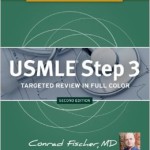The USMLE Step 3 represents an interesting paradox in medical education: it is the board exam whose results are the least important, but whose content is the most important. Maybe we medical students and medical educators have our priorities backwards? Here we have an exam that determines if you can competently diagnose and treat patients, and it is an afterthought when compared to an exam that tests whether or not we can memorize with perfection the Kreb's cycle. Does anyone else see a problem here? The truth is, you can not completely blow off Step 3 or you are in for trouble. Here are a few pointers on how to prepare for the exam
Scheduling
Ideally, everyone should take Step 3 in the second half of intern year. This will give you ample time to hone your inpatient hospital skills, something that will be critical for the new Computer-based Case Simulations (CSS), but not too much time to forget everything you learned in medical school and internship. Too often I meet specialists who are taking Step 3 at the end of their residency. There is nothing about a 5 year orthopedics residency (or any other residency) that will prepare you better for Step 3. To put off the exam for many years of residency will leave you unprepared and you will have lived with a weight over your head unnecessarily.
Remember, USMLE Step 3 is written specifically for the broad training culminating at the end of your internship. Technically, after your internship, if you pass Step 3, you can be licensed to practice medicine in the United States. Do whatever you can to get the test done during your internship.
Studying
You are going to be busy as an intern. If you have free time, you will want to sleep or relax; the last thing you will want to do is study for another board exam. You will not need much time to prepare for this exam, but you cannot completely blow it off. You need to find a way to reject the old saying, "two months for Step 1, two weeks for Step 2, two pencils for Step 3". If you think this way you are likely to waste your time and money. Let me illustrate two reasons why you should consider a small amount of studying:
- Most of you will focus either on children or adults during internship. You must be prepared to answer difficult questions about all age ranges on Step 3. If you are out of practice in pediatrics, study up.
- Very few of you will take care of OB/GYN patients during your internship. This is something else you will need to study
- The CSS is unique and has many quirks that you have not experienced yet. You MUST take the time to familiarize yourself with the format and how to succeed. If you do not prepare for this strange new testing format, you could make some logical choices during your exam that will not count. You simply need to spend a couple of days learning about the test itself and taking some of the CSS practice questions through the ACGME website. There is a great review of the CSS format and some of its nuances here.
Questions
As I have said before about other USMLE board exams, there is no substitute for a great question bank. Both Kaplan and USMLE World have great Q-banks, though I tend to prefer USMLE World. If you spend a solid week or two on questions, you will be more than ready.
Books
I think that one or two good review books can help a lot. The main goal of a review book will be to re-familiarize yourself with the specialties that you have not thought about in two years (pediatrics vs. adults, medicine vs. surgery, OB/GYN vs. everything else). Below is a list of books that I found useful. Again, you probably only need one or two of these.
- Updated June 2015
1. First Aid for Step 3:
|
|
2. Master the Boards USMLE Step 3:
|
|
3. Crush Step 3:
|






 My name is Andrew and I am a first year resident training to be an ophthalmologist. I created ShortWhiteCoats to provide medical students, residents, and the public with all the information I spent so many hours looking for during medical school.
My name is Andrew and I am a first year resident training to be an ophthalmologist. I created ShortWhiteCoats to provide medical students, residents, and the public with all the information I spent so many hours looking for during medical school.







